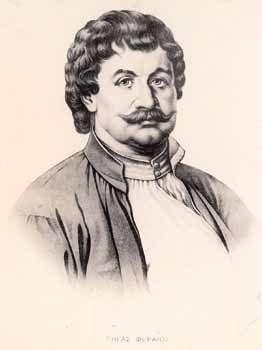Also known as:
Rigas Fereos, Rheagas Pheraeos, Rigas Velestinlis, Rhegas Velestinlis, Ρήγας Φεραίος, Ρήγας Βελεστινλής
More People of Greece
More Topic Categories
Related Destinations
Rigas Feraios (1757 - 24/06/1798)
 Rigas Feraios was a Greek author, political thinker and rebel. He is considered the precursor of the Greek Revolution of 1821.
Rigas Feraios was a Greek author, political thinker and rebel. He is considered the precursor of the Greek Revolution of 1821.It is uncertain exactly when he was born. Most of the information concerning Feraios’ childhood years, as well as a large part of his activities as an adult, is intertwined with legend and myth. The main reason for this is that all people that he collaborated with were arrested and executed and because most of his manifestos were destroyed. The aforementioned facts along with the need of the enslaved Greeks to create national heroic figures during the years that followed, as well as the lack of any sort of bibliography, created a veil of myth around him. The information we currently have comes from Perraivos, who was his colleague.
Feraios probably received his primary education by a priest in Velestino and later, Ampelakia. After returning home, he became a teacher. When he was 20 years old, he murdered a Turk because he was treated with disrespect and a despotic manner, so he went to Litohoro near Olympos. There, he joined the armatoles led by his uncle, Spyros Ziras. Sometime later, he went to Aghio Oros, where he was allowed to study at the Athonias School. Invited by the ambassador of Russia, he went to Istanbul for studies, and met Prince Alexander Ypsilantis, interpreter of the Sultan and grandfather to the future founder of the secret organization Filiki Etaireia, also named Alexander Ypsilantis.
Rigas went to Vienna, which eventually became his base for his revolutionary actions. His colleagues there were the Poulios brothers, from Siatista Kozani, who were typographers. At their printing press, Feraios published the Thourios in 1797, which was a patriotic hymn calling all enslaved Greeks to action. He also published his revolutionary manifestos which were to be shared to Greeks all over the Balkans, as well as many other of his works. What Feraios was working towards was the liberation and unification of all Balkans, including of course the Greeks, who were scattered all over the East and Europe. He was heavily influenced by the European Enlightenment and he believed Greeks should come in contact with all these new ideas.
The signing of the Russian – Turkish Treaty in Iasi, Romania, lifted Feraios’ spirit and his belief that Greece would be liberated. Nevertheless, it was far too early, as a revolutionary core had not yet been formed, but any acts of revolution were sporadic and were instigated by Feraios’ spirit. Feraios was later arrested, although the exact way of his arrest is uncertain. He was arrested in Trieste in December 1797 and was sent to Vienna. After many tortures, Feraios and the other Greeks that were arrested with him were strangled in June 1798 and their bodies were thrown in the Danube.
See Also:
 Athens Photos
Athens Photos
 Santorini Photos
Santorini Photos
 Crete Photos
Crete Photos
 Meteora Photos
Meteora Photos
 Corfu Photos
Corfu Photos



